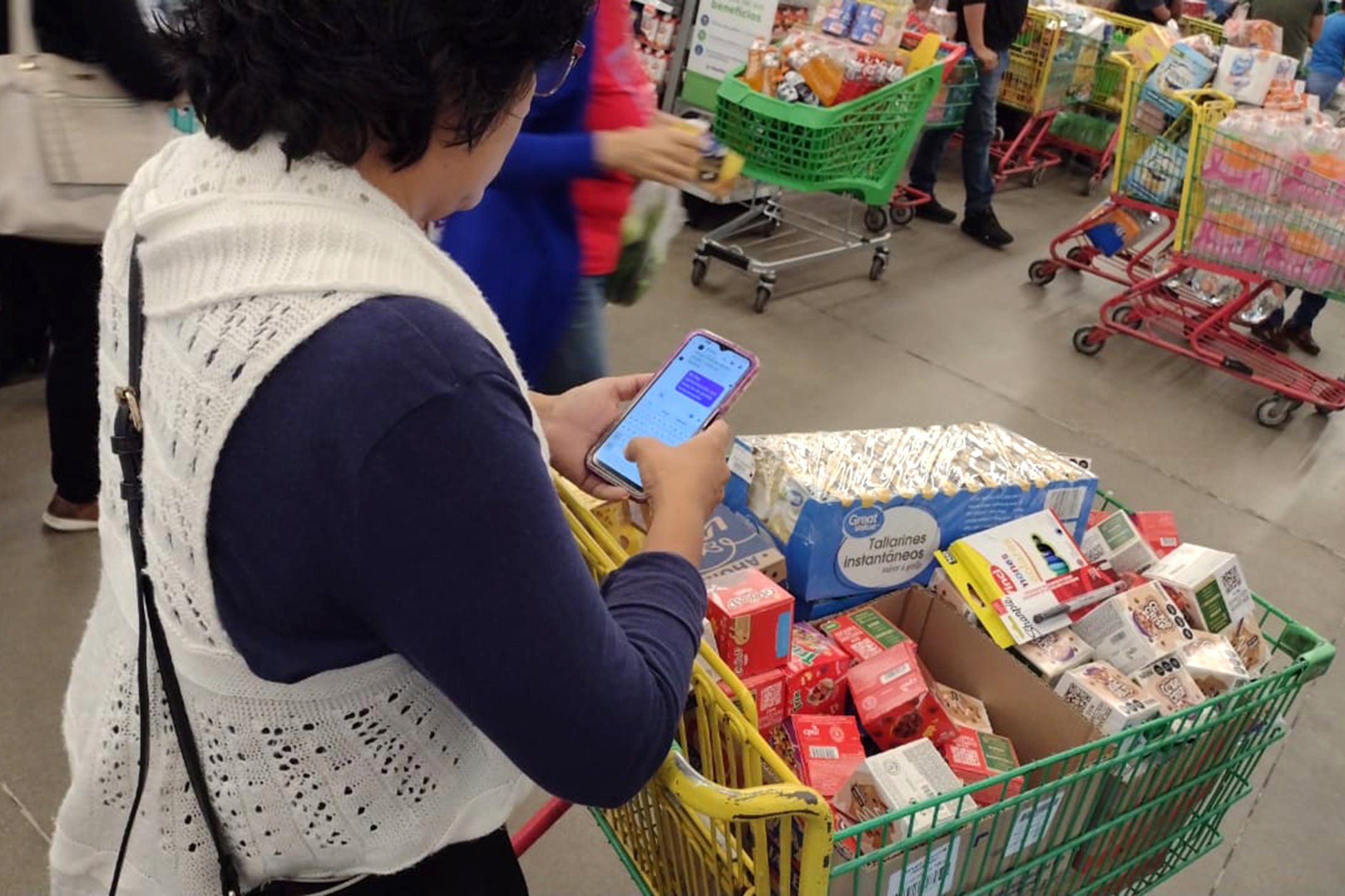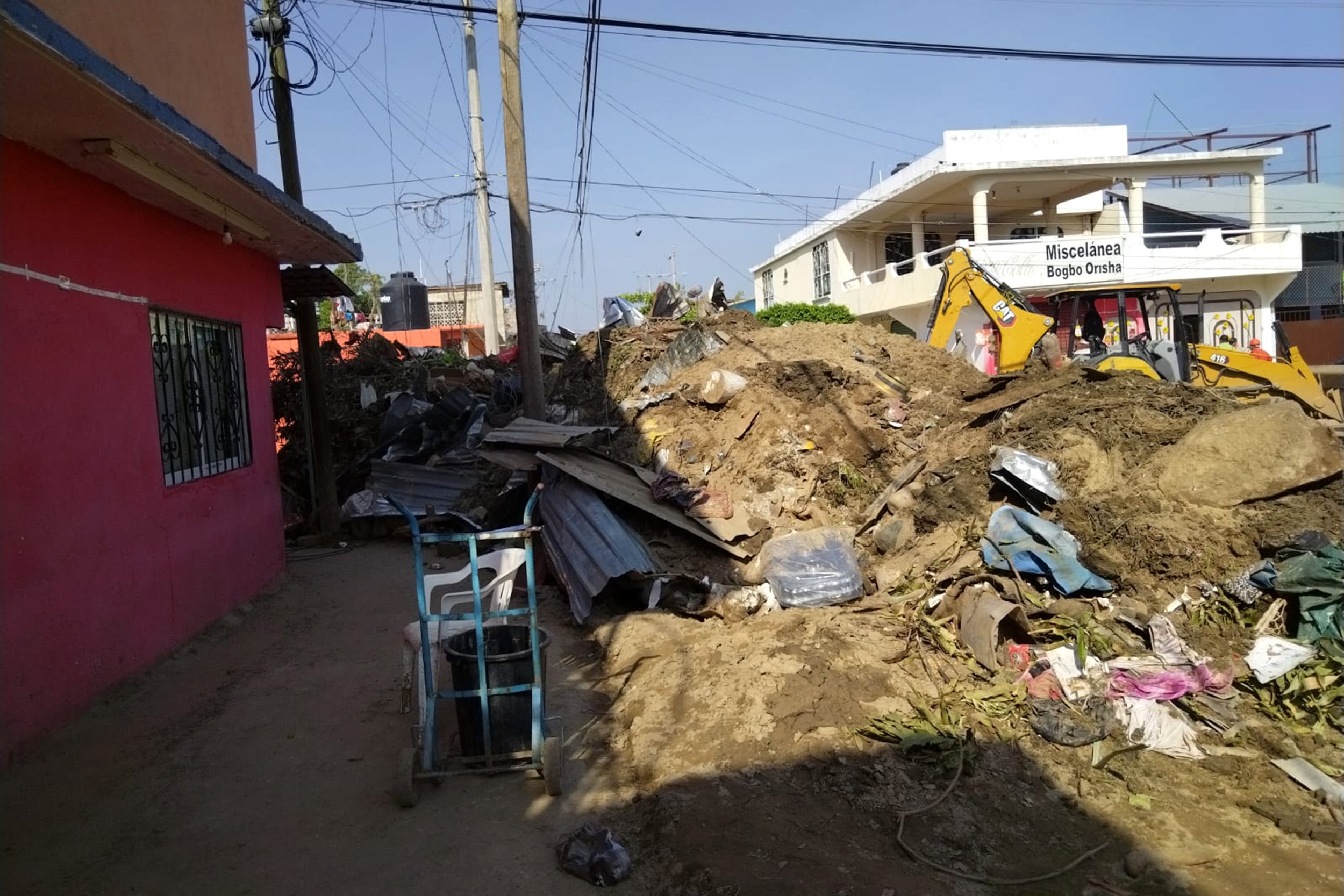Guerreros Beyond Borders
Pamela Contreras Franco and her daughter Aitana pose for a photo after Hurricane Otis. In order to receive federal aid, they had to prove that they had been affected by the hurricane. Photo courtesy of Pamela Contreras Franco
Cross-border immigrant organizations pivot to disaster relief following Hurricane Otis
Editor’s note: This story is part of the podcast “Home, Interrupted,” and its first episode, “Who Sends Help When Hurricanes Strike?,” produced by Feet in 2 Worlds.
When Juvenal Santamaría Contreras started his organization Guerrero Migrante, he never imagined he would end up helping immigrant families after natural disasters. Guerrero Migrante, was created in 2021, primarily to connect Mexican families separated by immigration. They have distributed donations from Mexicans living in the U.S. and they have helped build schools and pave streets in Mexico. The organization’s name has a double-meaning: “immigrants from the state of Guerrero,” and “migrant warrior.”
After a Category 5 hurricane hit the Pacific coast of Mexico in October 2023, Juvenal’s organization had to quickly shift its focus to respond to the disaster. Hurricane Otis hit Acapulco with winds up to 165 miles per hour, becoming the strongest Pacific hurricane on record to make landfall. Its rapid intensification left people with very little time to prepare. Experts say that Otis is part of a trend where climate change will continue to increase the intensity and severity of hurricanes to come.
‘Me being on the other side of the border, it's incredibly frustrating.’
The effects of Otis were so devastating that the Mexican federal government had trouble sending aid after the storm. Roads to the coast were severely damaged. There was no electricity and phone lines were down. People were desperate for food and water. When federal aid finally did make it to Acapulco the day after, it wasn’t enough. Local organizations were forced to step up and help, even those, like Guerrero Migrante, whose work had nothing to do with disaster relief.
Juvenal’s cousin Pamela Contreras Franco has lived in Acapulco her whole life. The day after the hurricane, she sent him an audio message through Whatsapp asking him for help. Juvenal, who lives an hour away from the coast, was able to bring supplies to his family. After two attempts he finally got to Acapulco and realized the magnitude of the catastrophe. He knew more help would be needed, so he sent pictures to immigrant communities in the U.S. asking for assistance.
Members of Guerrero Migrante buy food to deliver in Acapulco days after Hurricane Otis. Photo courtesy of Juvenal Santamaría Contreras
Soon donations to Guerrero Migrante began arriving, which the organization distributed among the most vulnerable communities. But the immigrants in the U.S. who were making the donations needed help too. Since there were no phone lines, most of them didn’t know what had happened to their families in Acapulco. Guerrero Migrante helped bridge the communication gap by going to Acapulco, finding displaced people, and sending messages back to their family and friends in the U.S.
One of the people who came to Guerrero Migrante for help was Saila Contreras Mendoza, a Mexican immigrant who has lived in Atlanta for over 20 years. Saila was worried about her mom, whose home was heavily impacted by the storm. “My mom was sleeping on a couch and her back was hurting,” said Saila. Saila went online and bought food, clothes and even a mattress — all things that Juvenal himself helped deliver to Saila’s mom in Acapulco. Later Saila got a video of her mom gratefully receiving those items.
For some immigrant families, the struggles after Otis have raised new questions. Vero Ocampo, a Mexican immigrant who lives in Minnesota, realized that her parents who live in Acapulco aren’t safe anymore. She also realized that, since she has been away from Mexico for so many years, helping them is not that easy. “Me being on the other side of the border, it's incredibly frustrating,” Vero said. “I wish I could say ‘relax, I’ve got this,’ but I don’t know how to do (things).”
The Ocampo family has had many uncomfortable conversations since then. Vero would like her parents to migrate to the U.S., where she can make sure they are safe. But her parents insisted on repairing their home and remaining in Acapulco. “We are Mexicans,” they said. “We worked our whole life to be able to live in Mexico.”
Alejandro (right), Pamela's husband, supervises repairs to their house. After Hurricane Otis, they decided to make their house more hurricane proof by taking down windows and building a wall instead. Photo courtesy of Pamela Contreras Franco
Some of the debris left outside Pamela’s restaurant after Hurricane Otis. Photo courtesy of Pamela Contreras Franco
Despite the destruction caused by Hurricane Otis, the Mexican government recently cut the federal program for aid after natural disasters. Mexico’s senate is expected to soon pass a bill that will put local authorities in charge of relief response. Critics of the bill say that individual Mexican states don’t have the resources to respond to disasters like Otis. As a result many believe that citizens, companies and grassroots organizations will have to take the lead in responding to climate disasters.
Guerrero Migrante is already preparing to be of greater help to the immigrant community if another natural disaster strikes. They plan to become trained as first responders, and they have started to create a database to help connect immigrant families more quickly following disasters.
Despite these preparations, for some living through a natural disaster will force them to move to a safer place. But, the feeling of wanting to return home will always linger, just as it does with Saila. She is constantly questioning if life is better on the other side of the border. She would like to go back to Acapulco. “My dream is to go back and be with my mom,” Saila says. “I want to be able to enjoy just a little bit of what I have worked for in the U.S.”
—
Greta Díaz González Vázquez is an international multimedia journalist with experience reporting in Mexico and the U.S. She tells bilingual narrative stories through audio, video and photography with a focus on gender violence, science and marginalized populations. Originally from central Mexico, Greta has worked in public radio and has freelanced for nonprofit newsrooms. Her work has been recognized with numerous national and state awards in her home country. @GretaDGV
Other palabra stories by Greta Díaz González Vázquez: Neglected and Exposed, Expuestos y en el Olvido






